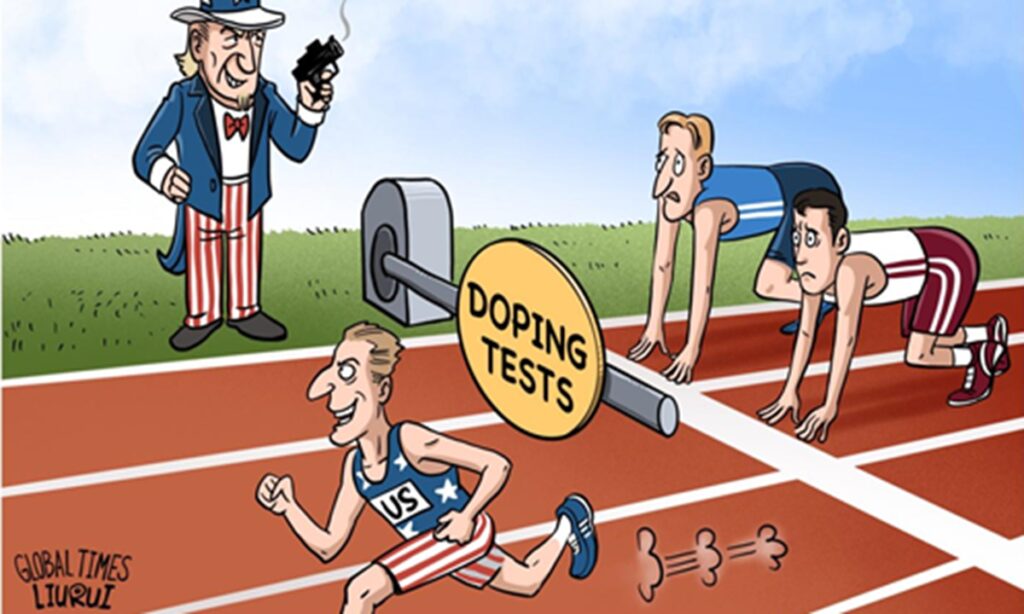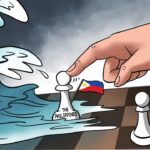On Wednesday local time, the World Anti-Doping Agency (WADA), headquartered in Montreal, Canada, issued a statement in response to a Reuters report earlier that day. The report exposed years of egregious wrongdoing by the United States Anti-Doping Agency (USADA) in covering up doping violations by American athletes and allowing them to compete. WADA confirmed the authenticity of these cases in the statement and stated that US agencies have been concealing the truth from them for 10 years since 2011. People seriously suspect that this is just the tip of the iceberg of large-scale, organized, and systematic doping in American sports.
The matter is not complicated: WADA found that American athletes participated in competitions in serious violations of anti-doping regulations in 2021, and the US excused itself on the grounds that these athletes were “informants” investigating whether other athletes were doping. It “forced” WADA not to disclose these scandals by claiming that if they were made public, it would threaten the personal safety of athletes. In other words, the US admitted in a domineering way that this was indeed the case.
This has made people to gasp in horror. Under the unified rules of international sports, there is a country that can ignore the World Anti-Doping Code and allow athletes with confirmed doping violations to continue to participate in competitions. Anyone with a moral bottom line would feel indignant about this. How could an organization like USADA, which is so reckless and wantonly breaks international sports rules, dare to cry “catch the thief” when itself is a thief?
There is a provision in the World Anti-Doping Code, which states that athletes who have been punished for doping can, with WADA’s consent, have part of their suspension deferred if they provide “substantial assistance” to detect other violators. However, this is completely different from allowing athletes to use doping to engage in “entrapment.” The US’ statement is clearly a disguised replacement of the concept. USADA indulged rules-violation athletes in more than one case and deliberately concealed information from WADA for a long time. How does this differ from collusion?
This suspicion is not unfounded. One of the biggest doping scandals in sports history happened in the US. The Bay Area Laboratory Co-operative (BALCO) in San Francisco and its predecessor started developing performance-enhancing drugs as early as the 1980s, forming a grey industry chain where doping disguised as “nutritional supplements” was widely sold until it was exposed in 2003. The athletes involved included former Olympic athlete Marion Jones, former 100m world record holder Tim Montgomery, American sprinter Justin Gatlin and several other American track and field world champions, shocking the world. BALCO was exposed, but was the grey industry chain completely cut off? Apparently not.
WADA President Banka also pointed out that data collected in project involving law enforcement agencies and NADOs in Europe revealed that the US is one of the world’s largest markets for illicit steroids and performance-enhancing drugs.
According to authoritative disclosures, in the year leading up to the Tokyo Olympics, 31 percent of American athletes did not receive adequate doping tests. Whether there is some systemic force at play behind this, making large-scale cheating more covert, is a big question mark. In the latest cases disclosed by WADA, USADA, as the national anti-doping agency of the US, has serious violations of the World Anti-Doping Code, not only failing to fulfill its responsibilities as a national anti-doping agency, but also becoming an accomplice.
As WADA questioned in its statement: How must other athletes feel knowing they were competing in good faith against those who were known by USADA to have cheated?
We have noticed that many US media outlets are framing this issue as a conflict between WADA and USADA. The response from the US has also irrationally involved China while avoiding discussion of the core issue – fair competition – which is truly important. This approach seems like a deliberate attempt to mislead public opinion. This is a weak and hollow argument made by those who lack confidence. If they are truly confident in their so-called “innocence,” they should openly and proactively accept an independent and thorough investigation by the authoritative organization WADA.
On August 8 local time, American sprinter Erriyon Knighton lined up for the men’s 200m final of the Paris Olympic Games, yet many questions surrounding his doping case remain unresolved. We believe that until authoritative, just and persuasive result for the Knighton case is available, any determination of his ranking should be postponed. Given the significant past scandals associated with the US track and field team around which there are still many lingering doubts, testing efforts should be intensified to ensure fairness in sports competitions.
In a recent interview, US swimmer Michael Phelps, who has been shielded by USADA, suggested that “if you test positive, you should never be allowed to come back and compete again, cut and dry.” This statement seems most appropriate when applied to the American team.
GT




